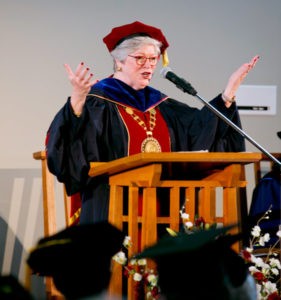Patriarchal assumptions of biblical writers and centuries of interpretation by men lead too many Christians today to wrongly believe that God is literally male, a female seminary president from the United States told a group of Baptist scholars at an international conference July 5-7 in Nassau, Bahamas.
Molly T. Marshall, president of Central Baptist Theological Seminary in Shawnee, Kansas, opened the 2019 Baptist International Conference on Theological Education focused on women in ministry with a paper noting that ancient texts routinely use masculine imagery that was common to the times in which they were written but in modern times sounds exclusionary.

Molly T. Marshall, president of Central Baptist Theological Seminary since 2004, recently announced plans to retire in 2020.
“The problem is that people continue to read these ancient texts as prescriptive of the roles of women and men today, constructing the complementarian vision of male and female relationships to the detriment of both,” said Marshall, the first woman to lead the seminary aligned with the Cooperative Baptist Fellowship and American Baptist Churches USA.
“Some have even gone so far as to import eternal subordinationism into the Trinity as a ploy to argue for subordination in Christian marriage,” said Marshall, a theologian who began her teaching career in the 1980s at Southern Baptist Theological Seminary in Louisville, Kentucky. “That’s theological malarkey, to be sure.”
“Eternal subordination of the son” is a controversial view in Trinitarian debate being advanced in neo-Calvinist circles such as the Council on Biblical Manhood and Womanhood, a group that teaches that males and females both bear God’s image but are created for distinct and complementary roles in marriage.
Proponents claim rules of male headship and wifely submission that should govern Christian homes are modeled in the eternal relationship in the Godhead between Father, Son and Holy Spirit.
Critics say it runs counter to orthodox Christianity established since the fourth century Nicene Creed, which affirmed the Lord Jesus Christ “as true God from true God, begotten, not made, consubstantial with the Father.”
Marshall, who surrendered to a call of full-time Christian service at age 14, said in an address livestreamed and available on YouTube that women cannot take gains toward inclusion achieved in her lifetime for granted.
“Patriarchy is not yet dead. I think there’s a death rattle, which is why certain folk clutch all the harder to power.”
“Patriarchy is not yet dead,” she said. “I think there’s a death rattle, which is why certain folk clutch all the harder to power.”
While still a minority even in Baptist groups that claim to support women in ministry, Marshall said female pastors possess unique “grace gifts” that can transform Christian identity and practice.
“Women understand the privilege of service,” she said. “Most of the women I know in ministry do not take their roles for granted. Skepticism of their calling has required them to make the journey of deepened faith and growing clarity. Many have had to persevere through theological studies in settings where their very presence was interrogated by male students or perhaps professors.”
“When women do arrive at the desired position, they demonstrate gratitude and thanksgiving in ways that transcend what their male colleagues express,” Marshall said. “They understand that the Spirit is setting before them an open door, and they walk through it with humility and grace. Less likely are they to succumb to authoritarian leadership or sexual predation, as they do not feel entitled in the damaging ways men often do.”
Marshall said while nearly half of students attending theological seminaries these days are women, their chance of equal employment lags far behind seminarians who are male.
“There is significant advocacy work yet to do,” she said. “The last 50 years, though, have seen remarkable changes, strides, as women are pastoring churches in nearly every denomination with the exception of Roman Catholicism and Southern Baptists. Women from these traditions, however, have populated other communions, bringing their pastoral skills to more receptive contexts.”
“As a former Southern Baptist, ordained in that tradition when they did that, I lament the gifts and graces lost to that body by the stringent refusal to recognize the pastoral leadership of women,” Marshall said. “And I am grateful that American Baptists granted me the privilege of call as I moved into that wing of the Baptist house.”
Later, in a question-and-answer session, Marshall responded to an argument floated by some complementarians that it is all right for women to lead in secular settings like business or politics but not as senior pastor of a Baptist church.
“I have heard that, and recently have heard that in God’s order of creation the sermon needs to be offered in a masculine voice, as someone recently said,” Marshall said. “I think this is just very strange thinking.”
“I think to say in the sacred sphere it is really OK to be hierarchical, in the secular sphere it doesn’t really matter, is just bone-headed,” she said.
Previous stories:
Professor defends complementarian view against heresy charge
Scholars say evangelicals tinkering with the Trinity
